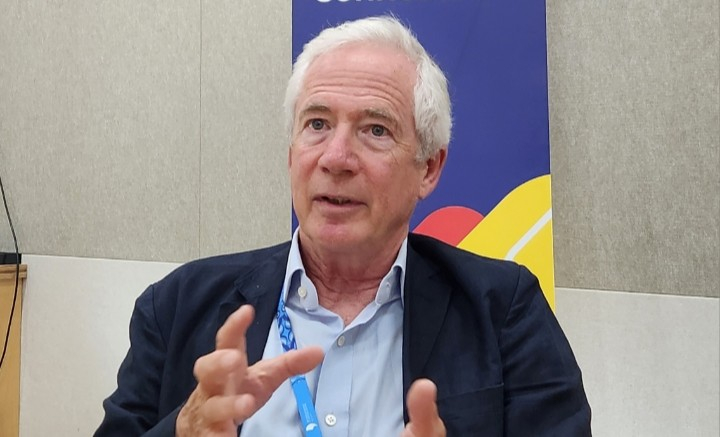![Nick McDowell, director of international at Arts Council England, speaks to the Korea Joongang Daily at Arko Arts Theater in Jung District, central Seoul, on May 29, 2025. [BRITISH COUNCIL]](https://koreajoongangdaily.joins.com/data/photo/2025/06/13/48b63a91-fb1b-4513-b3e8-5e0da43237e0.jpg)
Nick McDowell, director of international at Arts Council England, speaks to the Korea Joongang Daily at Arko Arts Theater in Jung District, central Seoul, on May 29, 2025. [BRITISH COUNCIL]
AI is an undeniable part of the creative ecosystem today, propelling institutions and policies to adapt. As technology speeds ahead of regulation, or even many people’s understanding, the question for art financiers is no longer just what to support, but how.
“We need to start shifting our focus and direct more of our resources toward supporting individual artists, and perhaps a little less toward maintaining institutions,” Nick McDowell, director of international at Arts Council England, told the Korea JoongAng Daily. “Buildings, infrastructure and organizations lose all meaning if there is no creative imagination filling them.”
Arts Council England is a government-funded organization dedicated to advancing the performing, visual and literary arts in England. Some of its most successful cases include the musical “Matilda,” created by the Royal Shakespeare Company, and “War Horse” by the National Theatre production, both of which were supported through public funds and have become global hits.
In 2016, it collaborated with Arts Council Korea, the Korean equivalent of the Arts Council England, to introduce and exchange talent. He visited Korea, a trip facilitated by the British Council, to meet more local artists and explore potential collaborations for the future. “I think Korea’s visual arts is a particularly strong sector that we’d be interested in, as well as the outdoor arts,” he said.
But his visit’s hot topic has been AI’s prospects in the arts.
Social Fabric is a textile project commissioned by Libraries Unlimited as part of Arts Council England National Portfolio Organisation funding.[ARTS COUNCIL ENGLAND/EMMA STONER]
For McDowell, the rise of AI presents an opportunity to shift the focus back to the human mind and its conjurings — a “counter-revolution.”
“I think AI will actually bring focus back to analog art, with people wanting to engage with the physical reality of art, whether it’s books, sculptures or performances on stage. I’m sure you’ll be able to see brilliant, flashy shows made by AI in the new world, but I believe the hunger for live performance featuring analog objects will continue, as the core of why we love art is human connectedness.”
While not fearing the new AI age for artists, he did voice concern about the issue of fair remuneration as an area that governments worldwide should step up.
“On one hand, there’s the economic perspective. AI represents an extraordinary opportunity for economic growth. But on the other hand, especially within the cultural sector, there’s a lot of concern. Yes, AI might benefit the economy, but what’s the cost? We’re seeing the widespread abuse of copyright, a total loss of intellectual property for artists whose books and works have essentially been consumed by large language models. The worry is that if artists are no longer able to earn a living from their work, if there’s no longer a clear system of ownership to demonstrate that a piece belongs to them, then how will they afford to keep creating?”
Both perspectives — economic and cultural — need to be held in balance, according to McDowell. But the world faces a fundamental question: In a world where traditional intellectual property rights are being eroded, how will artists be properly remunerated for their work?
“I think that can get lost in the excitement of innovation,” he said.
Nick McDowell, director of international at Arts Council England, speaks to the Korea Joongang Daily at Arko Arts Theater in Jung District, central Seoul, on May 29, 2025. [BRITISH COUNCIL]
One of the primary battles is between governments and corporations that have developed these AI models.
“They are bigger than most countries — and they’re not really subject to the legislation of any single nation,” he said. “Who among us is going to stand up to Apple, Microsoft or Meta and say, ‘Excuse me, but you need to pay for all the intellectual property your models have absorbed?’”
That kind of action, he added, is difficult for any one country to take alone, pointing to the growing need for international collaboration. Neither Korea nor the U.K. currently has explicit legal provisions addressing the copyright status of AI-generated works.
The European Union has taken a first step. Its AI Act, which went into force in August 2024, aims to provide developers and deployers with comprehensive requirements for specific AI uses, while also reducing administrative and financial burdens on businesses, according to the EU. But most of its provisions are not yet fully applicable.
“We’re dealing with global fragmentation, rapid geopolitical shifts, a rising wave of populism, a cost-of-living crisis, recovery from one pandemic — and, let’s be honest, the fear that another might come,” McDowell said. “In this context, governments and societies inevitably have a long list of urgent priorities. And unfortunately, artists and arts organizations tend to fall pretty far down that list.
“The status and the position of the artist within society is possibly under threat in a way that it hasn’t been for many years.”
He argued that the creative imagination should not be sidelined even in crisis, perhaps especially in such times. While it may be easier to focus on short-term, tangible outcomes, it is often art that lays the foundation for long-term thinking and innovation.
“Art creates a basic foundation for humans to create new ideas,” he said.
BY LEE JIAN [[email protected]]

